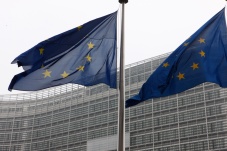Three Latvian humanitarian workers liberated in Darfur

Commissioners Piebalgs and Georgieva said: We welcome the liberation of Captain Artjoms Nalbandjans, co-pilot Janis Gindra and mechanic Kaspars Reihlers, who had been taken hostage in Darfur, Sudan, while working for the United Nations Humanitarian Air Service (UNHAS). The release of the three humanitarian workers came as a great relief for the EU and for Latvia.
Read the full statement:
Joint statement of Commissioners Piebalgs and Georgieva on the liberation of Latvian humanitarian workers in Darfur
The European Commissioners for Development Andris Piebalgs and International Cooperation, Humanitarian Aid and Crisis Response Kristalina Georgieva said today:
"We welcome the liberation of Captain Artjoms Nalbandjans, co-pilot Janis Gindra and mechanic Kaspars Reihlers, who had been taken hostage in Darfur, Sudan, while working for the United Nations Humanitarian Air Service (UNHAS). The release of the three humanitarian workers came as a great relief for the EU and for Latvia. We want to take this opportunity to pay tribute to the great work that is being done by humanitarian aid workers around the world, sometimes in extreme conditions. We must strengthen African and EU joint efforts to tackle the root causes of disasters and poverty and to ensure security, as we do in Sudan.
As soon as we learned the good news, we were in contact with Josette Sheeran, Executive Director of the World Food Programme, to whom we conveyed our relief and joy for the release of Mr Nalbandjans, Mr Gindra and Mr Reihlers. Yet, the fact that these three brave men were kidnapped highlights the difficulties faced by humanitarian workers in Sudan, where they continue to operate in the face of considerable threats.
The volatile security situation in Sudan significantly restricts the humanitarian access to the populations in need of relief. We call on all the parties to ensure the safety of humanitarians, so they can continue to help the millions of people in need. This will allow us in the international community to pursue ever more vigorously our objective to fight poverty and ensure security and development".
Background
UNHAS, which is run by the World Food Programme (WFP) is supported by the European Commission as an essential service enabling humanitarian workers to assist the victims of humanitarian crises in Sudan. Since 2008, the Commission, through it Humanitarian aid and Civil Protection department (ECHO), has allocated around €20 million to UNHAS in Sudan.
Three Latvian men, working as helicopter aircrew for UNHAS in the Darfur region, were seized by gunmen on 4 November. They were kidnapped in Nyala, the capital of South Darfur, while carrying out humanitarian work for the UN. The hostages have been freed after more than a month in captivity.
4.5 million people are affected by the six-year-long conflict in Darfur. The ongoing efforts of the humanitarian community to bring relief face enormous challenges. Aid workers' access is becoming increasingly hazardous.
Upon visiting Darfur last June, Commissioner Georgieva called upon the Sudanese government to bring to justice the perpetrators of criminal acts, as a culture of impunity would increase the risk for humanitarians, the local population and the refugees in Darfur.
Aid funding to Sudan
The European Union allocated in June €150 million to address the needs of the most vulnerable populations in Sudan, in particular in the war-affected areas, including the South of Sudan and Darfur, in the border regions between North and South Sudan (the Transitional Areas) and in East Sudan. This funding complements ongoing development and humanitarian programmes in Sudan, including over €500 million in development assistance committed since 2005 and over €750 million in humanitarian assistance since 2003. In addition, the European Commission has adopted an Instrument for Stability decision (€15 million) for the provision of basic services in South Sudan and support to the referendum process.















